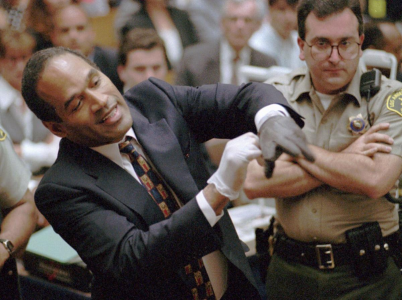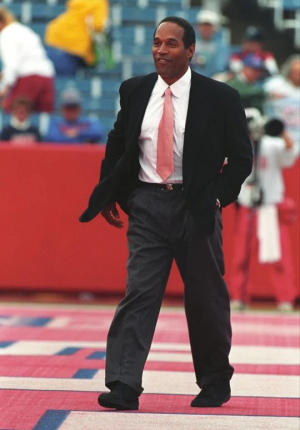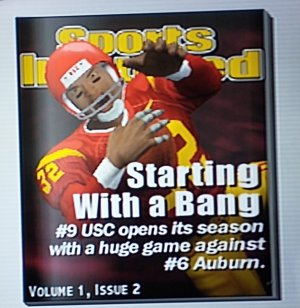
On June 15, 1995, O.J. Simpson grimaces as he tries on one of the leather gloves prosecutors say he wore the night his
ex-wife Nicole Brown Simpson and Ron Goldman were murdered in a Los Angeles courtroom.

Erik Brady: O.J. Simpson stole our fond memories of him
In his playing days, Simpson gave our rust-belt town a taste of Hollywood glitter. He was in the movies and on TV commercials. But we knew that his primary place of work was One Bills Drive. That made him one of us. Or so we thought, Brady writes.
O.J. Simpson was already dead to us.
That was my first reaction at the news of his passing. I'm not proud of that; it's less than charitable. But a jury found him civilly liable for the wrongful death of two people, including his ex-wife.
Once upon a time, he was a hero hereabouts. Then came the murders. And the slow-speed chase. And the murder trial. And the acquittal. And the civil trial. And the robbery trial. Our memories of watching No. 32 gallantly running for the Buffalo Bills were changed forever after all of that.
In his playing days, Simpson gave our rust-belt town a taste of Hollywood glitter. He was in the movies and on TV commercials. But we knew that his primary place of work was One Bills Drive. That made him one of us. Or so we thought.
I was in high school when the Bills made Simpson the No. 1 overall choice of the 1969 NFL/AFL draft. We could scarcely believe our good fortune. He was the best player on the planet, and he was ours.
I was in college when Simpson ran for a record 2,003 yards in 1973. He brought his blockers to the news conference. What a generous guy, we all thought, to share the limelight like that.
I was one of the reporters covering the Bills for the Courier-Express in the mid-1970s, at the end of the Simpson era. He was always available, whether for the New York Times or a three-watt radio station. One time he was a celebrity bartender for a charity event, and I ordered a screwdriver just so I could get an OJ from O.J.
As reporters and columnists, we often make the mistake of thinking we know the people we cover. We don't, of course. When word came that Simpson's ex-wife and another person had been stabbed to death, I felt certain (at first) that Simpson could not have done it. If he had, it meant not only that he had killed them, but that he’d left their bodies for his sleeping children to find. As it turned out, neighbors happened upon the scene first and called the police, but the killer could not have known it would go that way.
Look, it doesn't take much for reporters to think their subjects are good people. Returning our calls is about all we ask. Even after Simpson retired, in my early years at USA Today, I could get him on the phone. That's not how it works with superstars anymore. He was the most available of his time.
Simpson's pro career began at the Old Rockpile, in Buffalo. The new joint in Orchard Park was the House That O.J. Built. Perhaps the most joyous day in its history came on a chilly Sunday in January, 1991, when the Bills beat the Los Angeles Raiders, 51-3, to reach their first Super Bowl. Simpson was there, roaming the sidelines for NBC. Bills fans cheered him whenever he strolled by their sections. It seemed a harmonic convergence: Our greatest star and our fondest dream aligning right before our eyes.

The infamous photo O.J. Simpson wearing Bruno Magli shoes.
Harry Scull Jr./News file photo
The murders came only a few months after the Bills lost their fourth consecutive Super Bowl, in 1994. The gavel-to-gavel coverage of the murder trial encouraged today's trashy reality-TV culture. Simpson was famously acquitted: The gloves didn't fit. But in the civil trial, the shoes did. Plaintiffs' attorneys introduced 30 photos of Simpson wearing size 12 Bruno Magli shoes he had denied ever owning. Those "ugly-ass shoes,” as he called them, were the kind the killer had worn.
The photos had been taken as publicity shots for a banquet celebrating the 20th anniversary of Simpson's 2,003-yard season – his Italian luxury shoes set off against the green turf where he had once run to glory. The robbery case carried echoes of that season, too. Simpson was convicted of armed robbery after a 2007 incident in which he and others entered the Las Vegas hotel room of a sports-memorabilia dealer to take back items that Simpson insisted were his. Some of that memorabilia was from his 2,003 season.
I write frequently in these pages about Buffalo sports history, but last winter I chose to let pass the 50th anniversary of the day Simpson broke the 2,000-yard barrier. Who would want to read about that now?
O.J. Simpson stole our fond memories of him. It sounds so small to say. Stolen lives are what matter here. We know that.
But we can mourn our memories, too, forever stained with blood.

